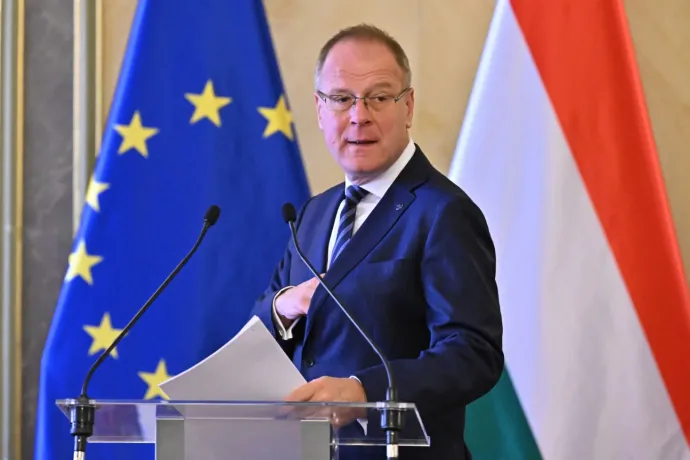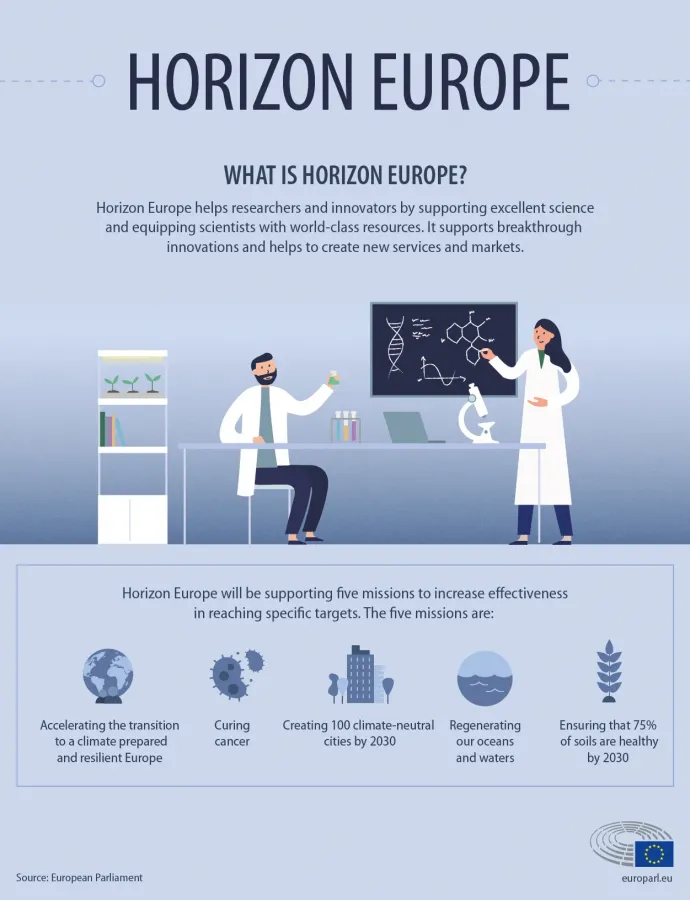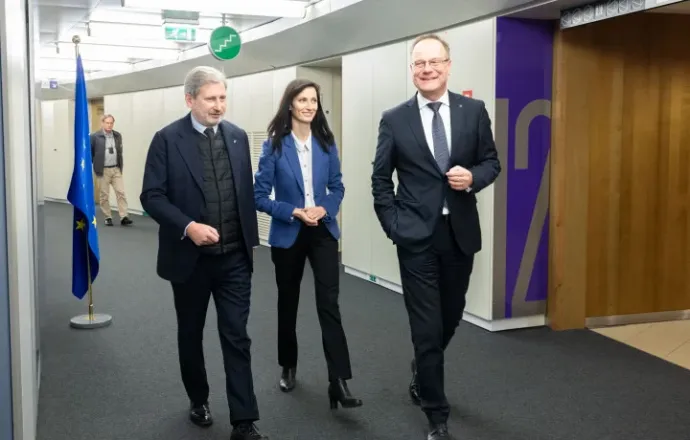
EU member states have blocked Hungarian universities from new grant contracts in the world's largest research program because of government officials sitting on the boards of the foundations that manage them. It is precisely these universities that the government wants to make the "locomotive" of a research and development-based Hungarian economy, and it has previously wanted to increase the participation of Hungarian institutions in Horizon Europe many times over. If the government acts in time, there will be no big problem, but the matter could be treated by the European Commission as part of a package with other rule of law objections, which could delay a solution.
The decision made by EU member states on 15 December to ban new EU commitments to public foundations and the institutions they manage is commonly referred to as the “Erasmus affair”, and affects 21 universities, mainly outside Budapest, that have been restructured over the past few years. However, in addition to the EU program for student and teacher exchanges, others, including Horizon Europe, which supports research and innovation, are also affected. While this affects fewer people directly, in many ways it is a bigger problem for Hungary:
- the government would like to increase participation many times over in the program which runs on far more money than Erasmus,
- while, unlike Erasmus+, applications are already affected by the exclusion of public foundations from grant contracts,
- and public universities could lose funding sooner.
However, if everything goes according to the government's plans, they can escape the immediate consequences, and a loophole could open up even for the worst-case scenario.
The government would speed up the spending
The decision has put public foundations at a distance from more than €95 billion in research and development funding, which the European Commission says is the most extensive program of this kind in the world. The amount that could be distributed between 2021-2027 is almost a third more than what was available over the previous seven-year period (Erasmus+ can spend around a quarter of that over the same period).

In 2021, the Hungarian government announced that it would increase the use of Horizon funds many times over, in line with the government's plan to build a research and development-based Hungarian economy, with the transformed universities as its "locomotives". At the time, the government wanted Hungarian institutions to use €2.1 billion, compared to €365 million in the previous period, the then Innovation and Technology Minister László Palkovics said at the conference of Portfolio in 2021.
This would be a roughly 5.7-fold increase compared to 2014-2020, which is a very ambitious target, while the amount available for funding has only increased by a third.
The increase in performance is also made more difficult by the fact that the biggest overall Horizon funding for the 2014-2020 period, €21.8 million, was brought to Hungary by CEU, the Central European University, which has since moved its core activities to Austria to escape government measures.
László Palkovics would have liked to see a leap in the amount of funding, because while based on its population, Hungary is eligible for 2.2 percent of the total amount, only 0.6 percent has been retrieved so far.
Researchers in the UK are not happy to be left out either
There is plenty of partners to choose from, because the program is extensive not just in terms of the amount, but also in terms of geographical coverage. As of September last year, 16 countries were associated with the program in addition to the EU members. They include EU candidate countries and participants in the EU common market, as well as non-European countries.
In addition, the program can also involve an institution from a country that has not yet joined the program as an “associated partner”. In this case, although they cannot apply for a Horizon grant, they can contribute to the costs from national funds to support the participating institutions.
The inconvenience of being excluded from the program has already been experienced by researchers from countries that are in a much better position than Hungary. Brexit would not have meant that British researchers would automatically be excluded from Horizon Europe, since they could participate as associated partners, like Norway and Israel. This type of association was included in the EU's 2020 Brexit agreement with the UK, but the long debate on the Northern Ireland protocol has left the details of the agreement unresolved.
"Horizon is where the party is"
– Martin Smith, head of the Wellcome Health Foundation, explained to Science why the EU program is important to them. While the UK government has said it will set up its own program if necessary and make up for lost funding – the national contribution was recently extended until the end of March – Martin Smith says it would be "extremely difficult to build something like this independently." The program is "not just about money" and it would be "a serious blow to the UK's attractiveness" if they could not stay in. James Wilsdon, a professor at the University of Sheffield, also said it meant recognition to win an international competition and not just some "lame" domestic imitation.
Indeed, Horizon Europe is not just about giving money. Typically, members apply together, in a consortium. The conditions of the application also make it clear that most calls require at least three applicants from different EU or associated countries, but many more are usually involved.

It has already affected a few applications, but it's no big problem (yet)
The European Commission confirmed in a statement on 27 January that universities with public funding backing can continue to participate in the current tendering process, with the ban only applying to the signing of commitments, which are due later. In addition to the projects that have already been completed or started, there are reportedly "a few" where the application has been submitted but had not yet reached the commitment stage by the time the decision about blocking was made on 15 December.
As we have reported before, the Erasmus+ applications have not even been submitted yet, with the problematic signature phase coming later in the summer, but the funds have already been secured until mid-2024.
If consortium tenders are also held up because of a public foundation participant, this can be particularly unpleasant for the parties involved, and the dispute is not generally good for their international relations.
The European Commission's Horizon information document specifically addresses the case of proposals that have already been awarded but have not reached the commitment stage. In such cases, the only way in which the contract could be concluded would be – if the proposal still remains eligible and there are no other legal obstacles to this – for the Hungarian party to remain in the project, but only as an 'associated partner'.
In practice, this would mean that it would not receive Horizon funding, but the government has promised to make up the shortfall. There are examples of such external funding elsewhere: sometimes a university from the United States is paid by the US government.
If, however, the publicly funded institution does not want to participate in this way in the project, the others
- either have to distribute their tasks among themselves (if this does not bring them below the mandatory number of participants),
- or find one or more suitable partners.
However, there are eight months to sign the contracts, and according to sources familiar with the matter, the first deadline is due to expire in May. The government intends to reach an agreement with the European Commission in March or April, meaning that, if all goes well, no consortium would have to face this dilemma.
The European Commission has also addressed the possibility of a new call for applications from the universities concerned. The institution would be allowed to apply, but if the ban is not lifted by the Member States before the grant agreement is signed, the public university would not receive any funding and would remain an associated partner in the project. According to the Commission's communication and the text on the page, this does not exclude it from being a normal participant in the tender – which was also confirmed by our source familiar with the matter.
All is not necessarily lost even if the government postpones the debate beyond May. The fact sheet says that in principle, new beneficiaries may be added to projects on the fly, even by 'stepping up' an associate partner once the Hungarian government has already sealed the deal.
When can they come to an agreement?
Last week, Regional Development Minister Tibor Navracsics discussed the necessary changes with the Commissioners who will issue the statement, Johannes Hahn, responsible for the budget, and Mariya Gabriel, responsible for innovation, education, research, culture and youth. He then announced that the Parliament could amend the law within a month, but that further consultations would be needed to define the duration of the trusteeship and the level of political office-holders beyond ministers to which the conflict of interest ban should apply. Tibor Navracsics had previously said that the Commission had no problem with the fact that high-ranking politicians sit on the boards of trustees, and that it was not clear who counted as such anyway.

According to Portfolio's sources, however, no new arguments were communicated to the minister in Brussels, it was merely the conflict of interest rules of the EU budget law that were reiterated, and the same had already been outlined many times. From the European Commission's point of view, it is perfectly clear that the problem with foundations lies with the politicians in legislative roles who, as ministers, state secretaries or MPs, can directly influence the allocation of funds, while the trustee organisations concerned can be beneficiaries, and the boards of trustees also decide on public procurement matters.
According to the resolution of the member states:
"despite repeated requests from the Commission, the Hungarian legislation still does not prevent high-ranking officials, including senior political leaders of the Parliament and Hungarian autonomous bodies, from sitting on the boards of public interest trusts".
The document also objects to the relaxation of conflict of interest rules in November 2022.
According to Portfolio, negotiations on lifting the restrictions could start in late March or early April, but this does not mean that public asset management foundations will automatically be allowed back into Horizon Europe and Erasmus+. This can only happen if negotiations on this are successfully concluded between the European Commission and the Hungarian government. The final say will be given by the Member States, which were also more lenient than the Commission proposal last time, although not on the issue of public foundations.
For more quick, accurate and impartial news from and about Hungary, subscribe to the Telex English newsletter!